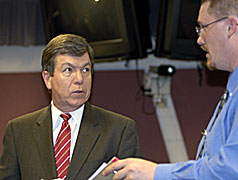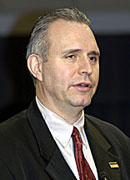 Rep. Roy Blunt, pictured left, discusses limitation of the No Child Left Behind Law with a TV reporter after a meeting of area school superintendents in which the media was not allowed to attend.
Rep. Roy Blunt, pictured left, discusses limitation of the No Child Left Behind Law with a TV reporter after a meeting of area school superintendents in which the media was not allowed to attend.
"The law is going to implode. It can't be done. Like many bills, it needs adjustments," Blunt said.
He invited the local media, but the meeting was supposed to be over when we arrived. The rationale behind keeping the media out of the actual meeting supposedly was to allow the school officials, as one bystander cleverly put it, "to be blunt with Blunt." The thinking from the Blunt camp was that rolling cameras would somehow tongue-tie the superintendents and interfere with the candid nature of the discussion.
Although that seemed highly unlikely considering the outpouring of frustration still evident in the room when the media finally was let in, it left Jim Simpson, superintendent of Joplin's R-8 schools, to act as chief spokesman for the group after the meeting had been adjourned.
 Dr. Jim B. Simpson, R-8 Superintendent of Schools, voices his disagreement over the No Child Left Behind law. Dr. Simpson did not buy the argument that the fed's goal wasn't to discredit the schools by making impossible demands.
Dr. Jim B. Simpson, R-8 Superintendent of Schools, voices his disagreement over the No Child Left Behind law. Dr. Simpson did not buy the argument that the fed's goal wasn't to discredit the schools by making impossible demands.
Making it clear that he had no problem with the intent of the law but with its implementation, Dr. Simpson declared that expecting 100% compliance by 2014 was impossible. Simpson also called attention to a stipulation in the law that allows states to set their own standards in measuring progress. He mentioned that Arkansas, as an example, had set lower expectations than Missouri, putting our state at a distinct disadvantage in meeting the deadline. "State standards need to be uniform," Simpson said.
The No Child Left Behind Act was signed into law by President Bush in January 2002. Both Bush and Secretary of Education, Ron Paige, claim to believe in "the bright potential of every child" and that "every child--no matter what his or her background, family income, or Zip Code--can meet high standards when challenged to do so." Anyone who has kept abreast of the problems inherent in education has to realize that this utopian notion is absolutely unreachable. The idea that teachers can be superheroes only drives many good ones out of the profession--either that or to a stress level that no amount of relaxation can reduce.
The new law sets strict requirements and deadlines for states to expand the scope and frequency of testing with testing results from one grade level compared to the same grade level of the previous year. Considering our mobile society and the fact that student populations can change from year to year, this method of evaluating test results has educators far from applauding.
The federal government also has mandated that the testing results be designed to find sub-groups such as non-English speakers and students from low-income families and to compare their results with the majority of students to determine if these sub-groups are achieving at the same level. This means that rural schools in Missouri and everywhere that have experienced a rapid influx of Spanish-speaking students have the challenge of bringing these students up to grade level by the deadline--a challenge they must face along with high transportation costs, teacher shortages, low salary levels, and chronic underfunding.
Critics have argued that there's no funding attached to this bill. Lack of funding to meet operating expenses has caused many school districts in Missouri to join a class action suit against the state, hoping for the release of budgeted money they believe to be rightfully due them.
According to Paige, Bush's proposed budget for 2005 includes $343.4 million earmarked for Missouri, a 49.6% increase since Bush took office. Kansas would receive $178.6 million, or a 44.4% increase. And the Department of Education contends that nearly $6 billion in federal education funds appropriated in 2000-2002 remained unspent. But the federal government in NCLB is black-mailing school districts by emphasizing accountability and abiding by federal policies with federal aid for schools conditional on those schools meeting academic standards.
Blunt discredited the idea that the federal government be expected to assume the responsibility for funding education. He claimed that funding has nearly doubled, yet educators cry for more.
There are shocking price tags on the programs schools districts seem to think they need to purchase, programs like "Read Now" with fancy workbooks and audio-video equipment. Are the days gone when a teacher used her own visual aids to teach concepts? But even though surveys are showing that pouring money into school districts does not equate with learning success, educators are still trying to dip into the taxpayers' pockets.
Perhaps, the administration of education has become much too unwieldy. There's an office of this, an office of that, a secretary and an assistant secretary, a deputy secretary and an under secretary, and, of course, a counselor to the secretary, not to mention all their assistants and sub-assistants. And what do some of those folks do who earn 6-figure incomes? Apparently, they still haven't succeeded in educating all students effectively.
"The day of money for nothing is over," Paige said in defending NCLB. "Administrators must be held accountable for the use of taxpayer money."






Comments